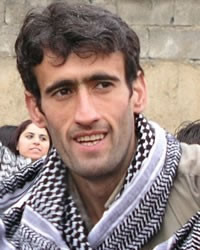Kurd, Kurmanji in Türkiye (Turkey)

Photo Source:
manothegreek
|
Send Joshua Project a map of this people group.
|
| People Name: | Kurd, Kurmanji |
| Country: | Türkiye (Turkey) |
| 10/40 Window: | Yes |
| Population: | 13,000,000 |
| World Population: | 16,544,400 |
| Primary Language: | Kurdish, Northern |
| Primary Religion: | Islam |
| Christian Adherents: | 0.01 % |
| Evangelicals: | 0.00 % |
| Scripture: | Complete Bible |
| Ministry Resources: | Yes |
| Jesus Film: | Yes |
| Audio Recordings: | Yes |
| People Cluster: | Kurd |
| Affinity Bloc: | Persian-Median |
| Progress Level: |
|
Introduction / History
The Northern Kurds of Turkey live in the most rugged part of Kurdistan. They are located near the Turkey-Iran border, and eastward along the Iraq and Syrian borders.
Kurds are divided by both outside influences and internal strife. Their lack of unity has prevented them from having their own country; their homeland (Kurdistan) is divided between Iran, Iraq, Syria, Azerbaijan and Turkey. Divide and conquer has worked well for the enemies of the Northern Kurds. Historically, in Turkey, Northern Kurdish villages have been burned and people killed, both by Turkish mobs and by the military.
Kurds are divided not only by political differences, but also by language. Northern Kurds speak Kurmanji, the largest Kurdish language. There are other Kurdish languages such as Sorani and Gorani.
What Are Their Lives Like?
In the mountain regions, winter temperatures drop to -30C. In the summer, they reach 45C. Water is scarce; and malaria, tuberculosis, and trachoma are persistent problems.
Kurds in Turkey make their living in the same way their relatives do in Iran and Iraq: farming and raising cattle and goats. Although a few Kurds still live the semi-nomadic lifestyle of their ancestors, most now live in small villages of less than 2000 people.
Although Kurdish farming techniques are somewhat archaic, they are now being integrated into the Turkish capitalist market. Cotton, sugar, beets and tobacco are replacing the traditional food crops. The Kurds grow them for the Turkish market and for export. Kurdistan is also the main source for cattle, sheep, goats and animal products in Turkey. Kurdish agriculture has changed little since the Middle Ages and is far behind the rest of Turkey.
Large families are the rule and most households have at least five or six members. Disintegration of the tribal structure began at the turn of the century and entered its final phase in the seventies. Massive migrations to the towns, as well as other cultural and social changes, have contributed to the extinction of tribal society.
Schools are ill-equipped and there are too few of them. Medical care is inadequate in the towns and almost non-existent in the rural areas.
What Are Their Beliefs?
Nearly all Kurds are Muslim, most being Shafiite Sunnis, and embraced Islam following the Arab conquests if the seventh century.
Although Kurds are predominantly Sunnis, there is stormy hostility between the Sunni Kurds and the Shia Kurds. These differences have class overtones, and the lower class minorities are associated with the more unorthodox sects of Islam. These have proven to be the most fervently rebellious parts of Kurdish society.
Even among the Sunni Kurds, there are traces of an earlier pagan and violent type faith which sets them apart from other Muslims. In the rural areas, a few still believe in jinnis, demons, and elements of animal worship. Mullahs (Muslim spiritual leaders) play an important role in the social and cultural life of those living in the country. Religious fraternities operate throughout Kurdistan. In the past, some influential sheiks (spiritual leaders) even became members of parliament. However, as time went by, their authority began to crumble. Today, their spiritual and economic power is being challenged.
What Are Their Needs?
Northern Kurds live in very poor conditions. Good water supplies are scarce, and they are exposed to diseases such as malaria and tuberculosis. Politically, they are oppressed by the Turkish government, and their violent reactions only makes the situation worse, especially for civilians.
Prayer Points
Pray for the Lord to send Northern Kurds loving and dedicated ambassadors for Christ.
Pray for Northern Kurds to find it in their hearts to put Jesus Christ first in their lives.
Ask God to use the small number of Kurdish Christian believers to disciple others who will make disciples of even more Kurds.
Ask the Lord to send dreams of the risen and victorious Christ to Northern Kurdish leaders.